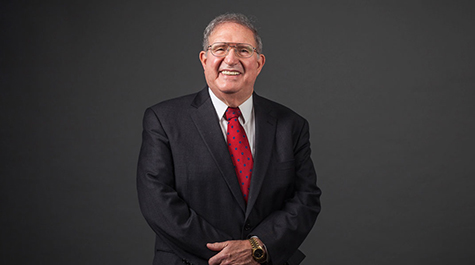Professor Steven J. Eagle to Receive Annual Brigham-Kanner Property Rights Prize
The William & Mary Law School Property Rights Project has named Professor Steven J. Eagle of the Antonin Scalia School of Law at George Mason University as the recipient of the 2019 Brigham-Kanner Property Rights Prize.
Eagle will be honored during the project’s 16th annual Brigham-Kanner Property Rights Conference, to be held at William & Mary Law School in Williamsburg, Va., on Oct. 3-4.
Michael M. Berger, an attorney at Manatt, Phelps & Phillips and the 2014 Brigham-Kanner Prize recipient, considers Eagle one of the finest property scholars of his generation.
“[Eagle] has devoted much of his life and his prodigious energy toward analyzing the constitutional nuances embedded in real estate law,” Berger said. “His deeply thought out analyses provide major contributions to the body of law examining and explaining the Fifth Amendment’s final (and almost forgotten) clause. His recognition with the Brigham-Kanner Prize is well deserved.”
Andrew Brigham, an attorney from Brigham Property Rights Law Firm, PLLC, in Jacksonville, Fla., and a member of the Brigham-Kanner Conference Coordination Committee, says that Eagle’s scholarship has long been a “beacon of light” that allows practitioners like himself to navigate the deep waters of regulatory takings.
“In deciphering takings jurisprudence, Professor Eagle has elected to not safely reside in academic critique, but has often chosen to charge into the mud and mire to cogently set forth the reasons for the elimination of inequitable procedural barriers and the introduction of workable general rules that promote equal protection of property rights,” Brigham said.
“Above all,” Brigham added, “Professor Eagle’s writings have always reflected a generous conversation, often pointing to the scholarship of others, so that one of his primary contributions is how he opens a window from which to view a broader landscape of critical thought within the academy on the virtue and value of property.”
Eagle earned his bachelor of business administration from the City College of New York in 1965 and his juris doctorate from Yale Law School in 1970. He taught at the law schools of Vanderbilt University, the University of Toledo, and Pace University before joining George Mason University in 1987. He teaches the first-year course, Property, Land Use Planning, and an advanced constitutional law seminar on property rights.
With his work in regulatory takings and other aspects of property law, Eagle plays an important role in the ongoing dialogue among American legal scholars, lawyers and judges on the proper interpretation of property rights in the Constitution. He is the author of a leading property treatise and scholarly and popular articles, and teaches in programs for judges and the practicing bar.
“Professor Eagle is a preeminent scholar in the field of land use and property law, and particularly with regard to regulatory taking,” said Professor David L. Callies, the Benjamin A. Kudo Professor of Law at the University of Hawai’i at Mānoa and 2017 Brigham-Kanner Prize recipient. “ His magisterial treatise, Regulatory Takings, has been the source of law on that subject for decades.”
Another recipient of the Brigham-Kanner Prize (2006), Professor James W. Ely, Jr., Milton R. Underwood Professor of Law Emeritus, Professor of History Emeritus and Lecturer in Law at Vanderbilt University, considers Eagle to be “among the foremost property rights scholars in the United States.”
“Widely respected, Steve is one of the leading experts in the complex field of regulatory takings of property,” Ely said. “I am delighted that he will be the recipient of the Brigham-Kanner Prize in 2019, an award that he richly deserves.”
The Brigham-Kanner Property Rights Prize is named in honor of the lifetime contributions to property rights of Toby Prince Brigham, founding partner of Brigham Moore, LLP, and Gideon Kanner, professor of law emeritus at Loyola Law School in Los Angeles. The prize is presented annually to a scholar, practitioner or jurist whose work affirms the fundamental importance of property rights.
Sponsored by William & Mary Law School since its inception, the annual property rights conference has taken on a larger international perspective as more and more countries deal with property rights issues. In 2011, the conference was held at Tsinghua Law School in Beijing, China, and in 2016 at the Grotius Center of International Legal Studies at the World Court in The Hague, Netherlands. Future international events are being planned.
Previous recipients of the Brigham-Kanner Property Rights Prize include Professor Frank I. Michelman of Harvard University (2004), Professor Richard Epstein of the New York University School of Law (2005), Professor James W. Ely, Jr., of Vanderbilt University (2006), Professor Margaret Jane Radin of the University of Michigan Law School (2007), Professor Robert C. Ellickson of Yale Law School (2008), Professor Richard E. Pipes of Harvard University (2009), Professor Carol Rose of the University of Arizona James E. Rogers College of Law (2010), retired Supreme Court Justice Sandra Day O’Connor (2011), Professor James E. Krier of the University of Michigan Law School (2012), Professor Thomas W. Merrill of Columbia Law School (2013), Michael M. Berger of Manatt, Phelps & Phillips (2014), Professor Joseph William Singer of Harvard Law School (2015), Hernando de Soto, president of the Institute for Liberty and Democracy (Lima, Peru) (2016), David L. Callies of the University of Hawai’i at Mānoa William S. Richardson School of Law (2017), and Stewart E. Sterk of the Benjamin N. Cardozo School of Law (2018).
To request a brochure about the Brigham-Kanner Property Rights Conference, or for more information about the event, please email Ali Trivette at mtrivette@wm.edu or call (757) 221-7466. Visit the conference website.
About William & Mary Law School
Thomas Jefferson founded William & Mary Law School in 1779 to train leaders for the new nation. Now in its third century, America's oldest law school continues its historic mission of educating citizen lawyers who are prepared both to lead and to serve.
